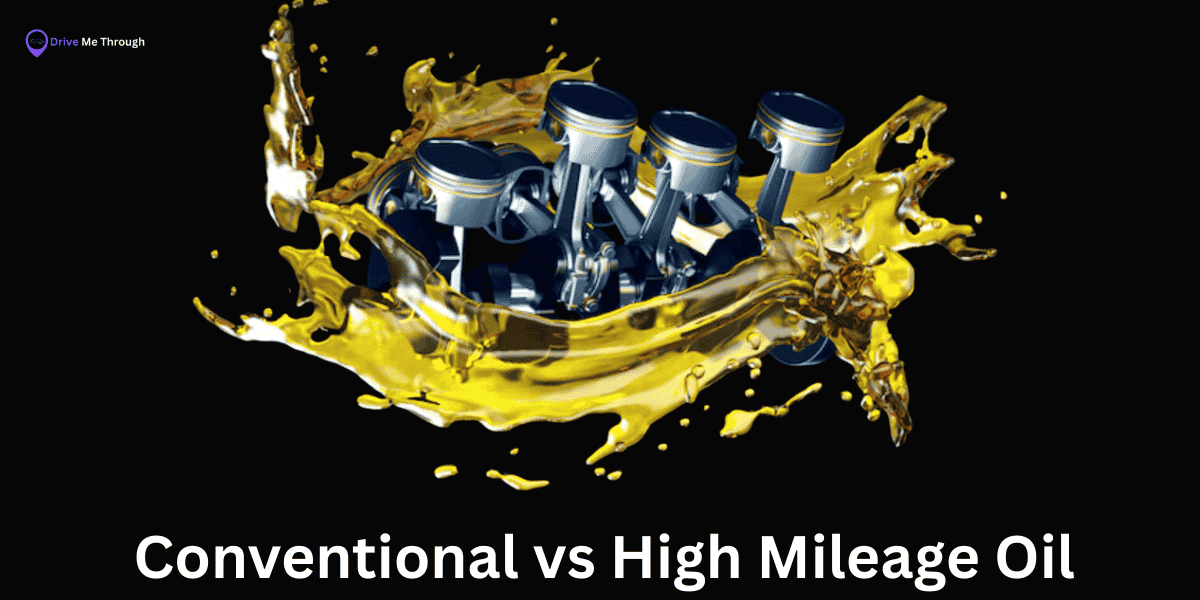
Conventional oil is best for new or low-mileage engines, offering basic protection at a lower cost. It works well under light driving conditions but breaks down faster under heavy use or high temperatures.
High mileage oil is specifically made for vehicles with over 75,000 miles, providing extra protection for aging engines. It helps prevent leaks, reduces oil burn-off, and extends engine life with advanced additives.
What is Conventional Oil?
Conventional oil is basic engine oil made by refining crude petroleum. It works best in new or well-kept engines with low wear.
This oil type has fewer additives and offers enough protection for regular driving. It fits vehicles used in normal weather and short-distance travel.
What are the Core Properties of Conventional Oil?
Made from Crude Petroleum
Conventional oil comes directly from crude petroleum and goes through minimal refining. This keeps it natural but less advanced than synthetic or high mileage oils.
Basic Additives Only
It includes standard additives like detergents and anti-wear agents. These give enough protection for engines that don’t face extreme stress.
Less Stable in Heat
Conventional oil breaks down faster when the engine gets too hot. This means it needs changing more often in high-temperature areas.
Forms Sludge Over Time
With time, it can leave behind sludge if oil changes are skipped. This sludge can slow engine parts and lower performance.
Benefits and Limitations of Conventional Oil
| Conventional Oil Benefits | Conventional Oil Limitations |
| Costs 30%–50% less than synthetic blends | Builds up sludge in high-temperature environments |
| Works well in new engines with tight tolerances | Breaks down faster under heavy stress or long usage intervals |
| Available in all automotive service centers | Provides limited protection for older or high-mileage engines |
What Is High Mileage Oil?
High mileage oil is made for vehicles that have over 75,000 miles on them. It helps engines that are older and starting to show signs of wear.
This oil has extra ingredients that reduce leaks, clean buildup, and protect worn engine parts. It’s made to improve how older engines run every day.
What Are the Core Properties of High Mileage Oil?
Includes Seal Conditioners
Seal conditioners in high mileage oil soften worn or shrunken gaskets. This helps stop small oil leaks in older engines.
Contains Strong Detergents
It has powerful detergents that clean out sludge and prevent buildup. This keeps engine parts cleaner and helps them move better.
Uses Viscosity Modifiers
Viscosity modifiers in this oil keep it thick enough to protect the engine at both hot and cold temperatures. This helps maintain smooth engine performance.
Benefits and Limitations of High Mileage Oil
| High Mileage Oil Benefits | High Mileage Oil Limitations |
| Reduces leaks by treating worn seals | Costs 20%–30% more than conventional oil |
| Lowers oil burn-off in aging engines | Unnecessary for vehicles under 75,000 miles |
| Protects worn engine parts and extends engine life | Can hide signs of engine damage temporarily |
Conventional vs. High Mileage Oil: Key Difference
| Attribute | Conventional Oil | High Mileage Oil |
| Target Vehicle | New or low-mileage engines (<75K mi) | Older or high-mileage engines (>75K mi) |
| Cost Range | $25–$40 per oil change | $40–$70 per oil change |
| Oil Longevity | 3,000–5,000 miles | 5,000–7,500 miles |
| Additive Quality | Basic detergents and inhibitors | Advanced seal restorers, modifiers |
| Leak Protection | Low | High |
| Engine Protection | Moderate under light usage | Enhanced under aging and wear |
When to Use Conventional Oil?
Use conventional oil if:
- Your car is under 75,000 miles.
- Your engine shows no leaks or sludge buildup.
- You change oil every 3,000–5,000 miles.
- You drive under light-to-moderate conditions.
When to Use High Mileage Oil?
Use high mileage oil if:
- Your vehicle has more than 75,000 miles.
- You notice minor leaks or gasket seepage.
- You want to extend the engine lifespan.
- Your engine consumes more oil than usual.
Do You Need Conventional Oil?
Yes, if your engine is under 75,000 miles, shows no leaks, and runs in mild conditions. Conventional oil works well in newer engines that don’t need extra additives. It provides reliable protection without the added cost of specialty oils.
Does Conventional Oil Improve Engine Performance?
Yes, conventional oil supports engine performance in clean, low-stress environments. It keeps engine parts lubricated and reduces normal wear when changed on time. This helps maintain smooth driving and fuel efficiency in newer vehicles.
How Often Should You Switch Oil Types?
You should switch oil types when your engine crosses 75,000 miles, shows signs of aging, or consumes more oil. Mixing oil types once won’t cause damage, but consistent use of the wrong oil type increases wear.
Why Should You Choose Valvoline Oil Change?
Valvoline Oil Change offers reliable protection for your engine, keeping it running smoothly. Their high-quality oils help reduce wear and extend engine life, ensuring long-term performance.
Choosing Valvoline ensures quicker oil changes with trusted products. Their extensive network of service centers makes maintenance easy and convenient for all vehicle owners.







